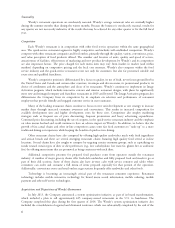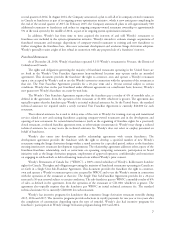Wendy's 2014 Annual Report Download - page 20
Download and view the complete annual report
Please find page 20 of the 2014 Wendy's annual report below. You can navigate through the pages in the report by either clicking on the pages listed below, or by using the keyword search tool below to find specific information within the annual report.Wendy’s business could be hurt by increased labor costs or labor shortages.
Labor is a primary component in the cost of operating our company-owned restaurants. Wendy’s devotes
significant resources to recruiting and training its managers and hourly employees. Increased labor costs due to
competition, increased minimum wage or employee benefits costs (including various federal, state and local actions to
increase minimum wages and government-mandated health care benefits), unionization activity or other factors would
adversely impact our cost of sales and operating expenses. In addition, Wendy’s success depends on its ability to
attract, motivate and retain qualified employees, including restaurant managers and staff. If the brand is unable to do
so, our results of operations could be adversely affected.
The Company, through a subsidiary, has withdrawn from a multiemployer pension plan. Wendy’s assumed an
estimated withdrawal liability in the fourth quarter of 2013, but the final withdrawal liability will be
determined through discussions with the pension fund administrator.
Prior to the fourth quarter of 2013, the unionized employees at The New Bakery Co. of Ohio, Inc. (the
“Bakery Company”), a 100% owned subsidiary of Wendy’s, now known as The New Bakery Company, LLC, were
covered by the Bakery and Confectionery Union and Industry International Pension Fund (the “Union Pension
Fund”), a multiemployer pension plan. The Bakery Company remitted contributions based on hours worked by
covered, unionized employees pursuant to a collective bargaining agreement that expired on March 31, 2013 and the
Rehabilitation Plan adopted by the Union Pension Fund in accordance with the provisions of the Pension Protection
Act of 2006 due to the underfunded status of the plan.
In December of 2013, the Bakery Company terminated its participation in the Union Pension Fund and
formally notified the plan’s trustees of its withdrawal from the plan. The Union Pension Fund administrator has
acknowledged the withdrawal, which required Wendy’s to assume an estimated withdrawal liability of $13.5 million
based on the applicable requirements of the Employee Retirement Income Security Act, as amended, and which was
included in “Cost of sales” during the fourth quarter of 2013. As a result, Wendy’s made payments to the Union
Pension Fund totaling $0.7 million during 2014 which were recorded as a reduction to the withdrawal liability. The
Bakers Local No. 57, Bakery, Confectionery, Tobacco Workers & Grain Millers International Union of America,
AFL-CIO (the “Union”) filed a charge with the National Labor Relations Board (the “NLRB”) related to the Bakery
Company’s withdrawal from the Union Pension Fund. On July 22, 2014, The New Bakery of Zanesville, LLC
(“Zanesville”), a 100% owned subsidiary of Wendy’s, and the Union entered into a settlement agreement with the
NLRB. The terms of the settlement include an agreement by Zanesville and the Union to recommence negotiations.
Zanesville and the Union have recommenced negotiations. Any final withdrawal liability will be determined through
discussions between Zanesville and the Union Pension Fund administrator at the conclusion of the negotiations with
the Union.
The unionized employees became eligible to participate in the 401(k) Plan as of December 5, 2013.
Complaints or litigation may hurt the Wendy’s brand.
Wendy’s customers file complaints or lawsuits against us alleging that we are responsible for an illness or injury
they suffered at or after a visit to a Wendy’s restaurant, or alleging that there was a problem with food quality or
operations at a Wendy’s restaurant. We are also subject to a variety of other claims arising in the ordinary course of
our business, including personal injury claims, contract claims, claims from franchisees (which tend to increase when
franchisees experience declining sales and profitability) and claims alleging violations of federal and state law regarding
workplace and employment matters, discrimination and similar matters, including class action lawsuits related to
these matters. Regardless of whether any claims against us are valid or whether we are found to be liable, claims may
be expensive to defend and may divert management’s attention away from operations and hurt our performance. We
cannot estimate the aggregate possible range of loss due to most proceedings being in preliminary stages, with various
motions either yet to be submitted or pending, discovery yet to occur, and significant factual matters unresolved. In
addition, most cases seek an indeterminate amount of damages and many involve multiple parties. Predicting the
outcomes of settlement discussions or judicial or arbitral decisions are thus inherently difficult. A judgment
significantly in excess of our insurance coverage for any claims could materially adversely affect our financial condition
or results of operations. Further, adverse publicity resulting from these claims may hurt us and our franchisees.
16
























